I’ve been sitting on this review for the past couple of months, not because I don’t have anything to say but because all I have to say is how much I love this series (I love it so very much). I went into the first book The Cloud Roads expecting to like it, but I wasn’t prepared for how much I enjoyed it. All three books are simply amazing, and they remind me of the fantasies I loved when I was younger, particularly the Earthsea Chronicles and the early Pern books.
Simply put, the Books of Raksura are such satisfying reads and so satisfyingly different from what you’d expect of high fantasy. It doesn’t take long for you to be fully immersed in the setting and adventures. It took me only a few pages to fall into the Three Worlds completely. I mean, how could anyone resist? There are flying islands, many of them now in ruins used to belong to long dead civilizations. The more you learn more about the Three Worlds, the more you want to live there, and I didn’t want to leave. I mean I literally could not put The Cloud Roads down and ended up breezing through the whole series, short stories and all, in a matter of days. It was a whirlwind experience, and it’s been a long time since a series sucked me in so completely that way. It shouldn’t have come as a surprise though. Martha Wells is an amazing storyteller.
Now onto the best part of the Three Worlds: Raksura. These are shapeshifters who have two forms: groundling, which is a humanoid form and the one they’re often in, and Raksura, which is a winged or wingless reptilian gargoyle-like form and the one they take when they fight or hunt. Winged Raksura, called Aeriats, are divided into three castes: queen, consort, and warrior. Wingless Raksura, called Arbora, are divided into four castes: mentor, teacher, hunter, and soldier. More about each individual caste here. Their functions and distinctions in Raksura court and society are a big part of the story, and I find their dynamic fascinating, so different from the usual Medieval European-like court politics of most high fantasies. And just their day to day lives are a treat to read about.
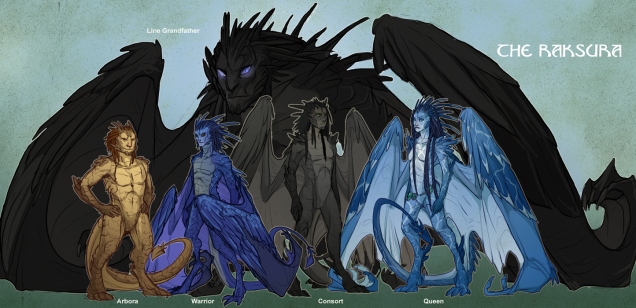
(Raksura by Jessica Peffer)
The antagonists of the Three Worlds are the Fell who are also shapeshifters, but they’re more like warped perverse versions of the Raksura. The Fell are also divided into castes and have some kind of society and pecking order, but they’re altogether much more medieval and bloodthirstier than the Raksura. They feed on other groundlings, are responsible for destroying civilizations all across the Three Worlds, and brutalize their own. Even Raksura fear them. But the interesting thing is it’s believed by some Raksura scholars that the Fell and Raksura once shared a common ancestor. When you look at the two races with that in mind, it adds more depth to the story and you begin to see their innate hatred of each other more clearly. Later books and stories expand more on this idea, but only a little bit at a time.
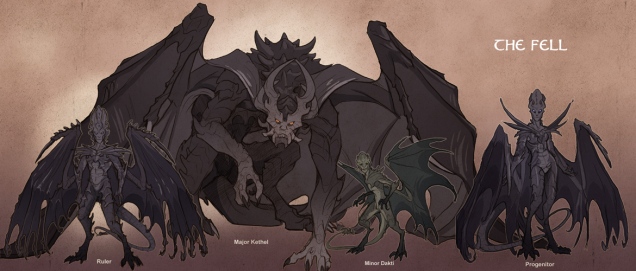
(The Fell by Jessica Peffer)
Beautiful fan art. I had a hard time picture the line grandfather and major kethel until I saw Jessica Peffer’s versions.
Basic premise (and some spoilers)

Rating: ★ ★ ★ ★ ☆
Date Read: January 30 to February 2, 2015
The Cloud Roads begins with a solitary Raksura named Moon, who had been living among various groups of groundlings for most of his life. He’s never been able to fit in anywhere and doesn’t even know what he is. At the start of the book, he’s been living for quite some time in a groundling village before inevitably getting kicked out again. This time, though, it leads him to find another Raksura (Stone), or rather Stone found and rescued him.
With nowhere to go and a desire to learn about Raksura, Moon decides to trust Stone and follow him back to his court, Indigo Cloud, which is only a few days’ flight away. On the way there, they stop by another court, but unfortunately not before it was completely destroyed by the Fell, which have increasingly become a menacing presence in these parts of the Three Worlds. Stone brings Moon to Indigo Cloud not only out of his goodness of his heart but for an ulterior motive, which is to help the court fight off the Fell.
As expected, Moon has a difficult time fitting into yet another group of people who view him with suspicion and sometimes distaste, but Jade, the young queen, takes an interest in him and he seems to like her too. However, all of that is put aside as more pressing matter arise and the Fell attack. Moon must decide if his place is to help the Raksura or leave because it’s not his fight. He decides to stay.
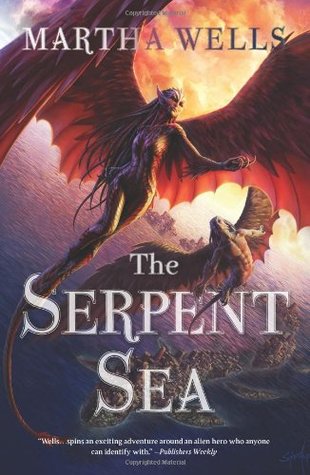
Rating: ★ ★ ★ ★ ½
Date Read: February 3 to 5, 2015
The Serpent Sea takes place after the fight with the Fell. Moon is now a member of the Indigo Cloud court and takes his place beside Jade as her Consort. He’s settling into his new role and has even made a few friends, but before he could get comfortable, new trouble finds its way to the court.
The survivors of Indigo Cloud decide to pack up and leave their pyramid mound. Too many bad memories there for them to stay, and like Stone said, the colony is too hard to defend from Fell attacks. So they head to the court’s original territory in the Reaches, the forest of their ancestors where Raksura originated. The journey is uneventful and they reach the colony tree in a matter of days. Once there, though, they discover the tree’s seed pod is missing and that the tree itself will die gradually if the seed isn’t recovered. Moon, Jade, Stone, and a number of beloved characters from the previous book head out to find the seed, and the journey takes them across the Reaches and into the Serpent Sea.
Reading this book is like going on the journey. There are so many awe-inspiring things to mention: an ancient leviathan with a city on its back magically enchanted to stay afloat, the city on its back, the museum in the city on its back, flying boats, the vastness of the Reaches, and last but not least the colony tree itself. It’s like a multi-level city-sized tree house complete with running water, pools, and platforms for farming. The world building and details in this series is mind-blowing and gets better and better with each book.
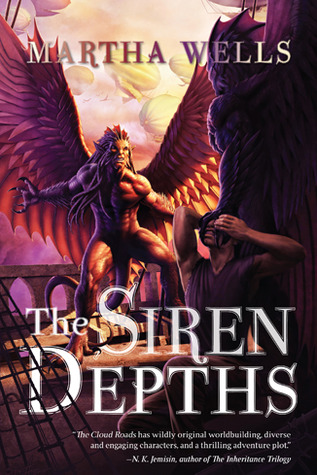
Rating: ★ ★ ★ ★ ★
Date Read: February 5 to 9, 2015
Now that the Indigo Cloud court has settled into their new home, Moon and Jade focus their attention on starting a family, but conceiving proves to be more difficult than either had anticipated. Meanwhile, a powerful court with a powerful reigning queen on the other side of the Reaches makes a claim on Moon. She thinks he is the son she lost during a Fell attack on her colony many years ago. These events line up with Moon’s age and vague memories of that time and Sorrow, the Raksura he thought was his mother. According to Raksura law, if a consort hasn’t fathered a clutch yet, then his birth court still has claims on him. Once a “feral solitary” with no known ties and a muddled bloodline, Moon now has two courts that want him.
The Siren Depths is about lineages and bloodlines, of both the Raksura and the Fell, and they’re explored through Moon, his birth queen, their court, and what happened to their home in the East all those years ago. In short, Moon finally knows where he came from. Revealing any more would spoil the rest of the story, but I will say that it’s a great story full of surprises. It had me glued to each page; a few meals were missed and phone calls went ignored. Moon’s birth mother is such a great character (so great!), and her court and her side of the story are an intriguing addition to the narrative and Moon’s arc. They not only add interest and tension, but a whole heaping amount of history and heritage and so much more depth to an already rich vibrant series.
I will never get tired of rereading these books or singing their praises. They are, hands down, my favorite kind of fantasy and exactly what I had been looking for at the time to revitalize my love for the genre. If you’re tired of the same old fantasy books and want to try something new and different, give this series a go. Martha Wells never disappoints, and these books will take you on an unforgettable journey.
[ETA]
A post by Martha Wells (about Stories of the Raksura, Volume II) is featured on John Scalzi’s blog Whatever.
In many ways, the Raksura books are the books I’ve always wanted to write, it just took me writing a bunch of other books to figure it out.
Also on Whatever by Martha Wells:
* * * * *
Still captivating, still beautiful. These books bring my fantasies of flying and living in trees to life–well, as close to reality as possible.
This is my third reread and I still find this world and these characters as interesting as when I first picked up this series and read it in a matter of days.
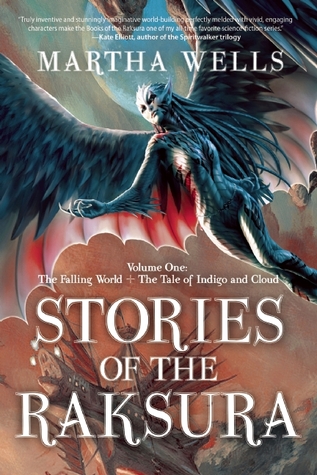






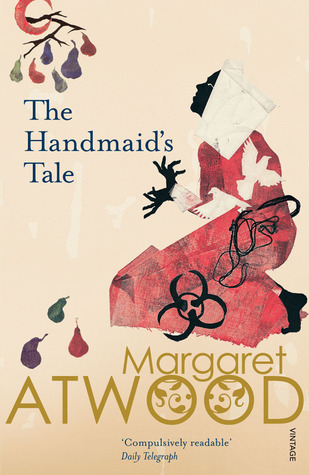



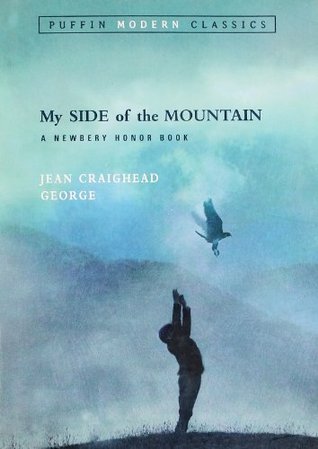

You must be logged in to post a comment.